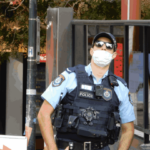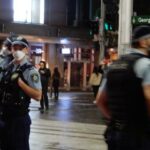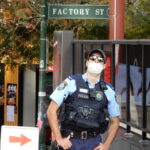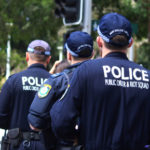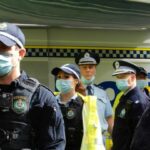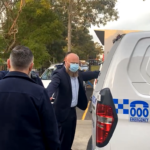Report Condemns Heavy-Handed Response to COVID and Calls for Fines to Be Dropped
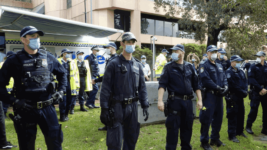
A Redfern Legal Centre-led challenge to three COVID fines issued by NSW police, resulted in the NSW Supreme Court finding in November that the infringement notices were invalid as they weren’t in accord with the Fines Act 1996 (NSW), which requires the detailing of a specific offence breached.
This led Revenue Australia to cancel 33,000 COVID fines, amounting to close to $30 million. And following the case, the Law Society of NSW has joined in calling for the remaining 29,000 pandemic fines to be dropped, highlighting that many were handed out in areas of significant disadvantage.
“These are consequences of a decision to ‘criminalise’ noncompliance with special COVID-19 public health rules,” the authors of a UNSW Centre for Crime, Law and Justice report note, “particularly restrictions on social gathering, ‘stay-at-home’ orders and mandatory mask-wearing.”
Released just after the outcome of the court challenge, the report found that criminalising the failure to comply with public health measures, coupled with police enforcing compliance via steep COVID fines issued as punishment, should not be an approach taken in the future.
The report, which ends with a postscript about the outcome of the RLC legal challenge, also recommends that the NSW government drop all outstanding COVID fines to alleviate the debt burden, especially those issued to children and people experiencing financial hardship.
Ongoing legacies
The COVID Criminalisation in NSW: A ‘Law and Order’ Response to a Public Health Crisis report sets out that between March 2020 and September 2022, 62,131 pandemic fines were issued by NSW police, with a total value of $56,578,740.
More than 80 percent of these fines, or $45,900,180 worth, were issued over the three months July to September 2021, in response to the Delta outbreak. And much of the financial burden fell on socioeconomically disadvantaged areas in southwest and west Sydney, along with western NSW.
Close to $16 million worth of fines were still outstanding in October last year. And the report authors note that rather than having a commonly perceived benign affect, fines result in “a long legacy of debt, and involve a significant level of punitiveness”.
The extreme use of fines during the pandemic also damaged police-community relations, as was evidenced in a statement by the Dharriwaa Elders Group in the northwestern NSW town of Walgett, which highlighted the detrimental effect the discretionary use of fines had on the local community.
The Centre for Crime, Law and Justice report was conducted after a coalition of legal organisations, including the Aboriginal Legal Service NSW/ACT and the RLC, called on the NSW government to pause COVID fine debt enforcement in late 2021.
And the UNSW authors found that “the twin legacies of a large debt burden for the socially disadvantaged” and the erosion of police and community relations were not inevitable outcomes of the pandemic.
A “flurry of law-making”
The report more broadly analyses three aspects of the NSW government response to the COVID-19 pandemic. The first is the “flurry of law-making” that took place in the form of public health orders under the legal framework set out in the Public Health Act 2010 (NSW).
The NSW Ombudsman reported last September that between March 2020 and January 2022, 266 principal public health orders and amendments were made, which averages at one order every 2.5 days for 2 years, and there were 53 days when two public health orders or amendments were made.
This process strayed from the rule of law in that laws should be made by parliament, they should be known to the public, they should be enforceable and this must be consistently so, penalties issued should be proportionate and the enforcement action should be subject to review.
The issues related to this process became more acute with the outbreak of Delta, which resulted in a 2021 five-month-long statewide lockdown, the strictest in NSW. And this was accompanied by a period of hasty law-making and mass criminalisation through fines, which generally were $1,000.
Enforcing COVID measures
The report then turns to enforcement, outlining that there was a huge spike in COVID fines issued over the first five months of the Delta wave, which related to almost 90 percent of fines issued, and this coincided with a hardening of the NSW government and state police “enforcement mentality”.
UNSW researchers wanted to identify which restrictions were punished most frequently, however they found this wasn’t possible as most fines, or 35,973, were recorded against a generic breach: failure to comply with noticed direction or fail to comply with requirement of public health order.
This generic breach formed the basis of the Redfern Legal Centre challenge to three COVID fines, which had implications for the entire batch, as it was found the lack of detailing an actual breach failed to meet the requirements set out in the Fines Act, making these penalty notices void.
COVID penalty notices were found to be unevenly distributed as well, with an overrepresentation within socioeconomically disadvantaged suburbs and towns.
The top ten local government areas hit by COVID fines were Brewarrina, Bourke, Walgett, Coonamble, Central Darling, Warren, Gilgandra, Moore Plains, Sydney and Dubbo. And all of these regions have significant numbers of First Nations people living within them.
The report also highlights the rolling out of heightened restrictions specifically in southwest and western Sydney, which resulted in exacerbating pre-existing issues and further, the compliance strategy during Delta saw the overpolicing of areas that were already subject to such a focus.
Mixed messaging
The third aspect to the pandemic response the report focuses on are the messages that were communicated by leaders from the NSW government and the NSW Police Force.
In its analysis of media reporting during the first 2020 COVID wave, the report found there was a focus on COVID-19 being a public health concern, that police should show discretion and caution when issuing fines and there was a degree of inconsistency in the messaging from various leaders.
While the three prominent themes that characterised the messaging of authorities during the Delta wave were continuing inconsistencies, a shift away from the discretionary approach to mandatory punishment and a disregard for due process, which was replaced by “cavalier” policing.
The report authors note that the change in enforcement during Delta, which included a huge spike in fines, might be explained away by noncompliance in the community, yet this was an overly simplistic assumption.
So, in comparing the messaging of the NSW government and the NSW Police Force during the first wave of COVID and the subsequent Delta wave, the authors found that with the latter there “was a discernible hardening in the publicly declared ‘enforcement mentality’ of leaders”.
Policing pandemics
The report authors conclude that NSW residents found themselves in the middle of a law-and-order crisis during the pandemic, with individuals being criminalised for behaviours that would previously have never brought them into contact with law enforcement.
Further, the “extraordinary times” excuse for what happened over the pandemic was inadequate, especially when considering that between July and September 2021, there were 350 COVID-related deaths in NSW, compared with 1,724 such deaths over the same three months in 2022.
The researchers concluded that a key lesson from these outcomes is that “deploying conventional ‘crime control’ tools doesn’t work in a health crisis, and rather than assuming compliance will be low, a focus on educating the community about its duty to comply would have been more effective.


